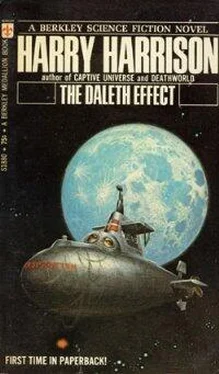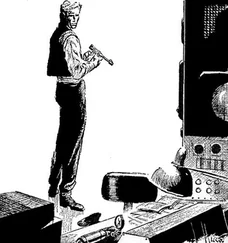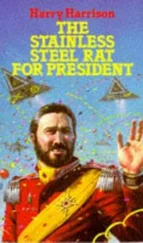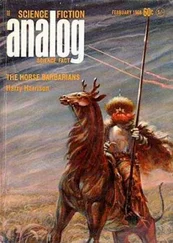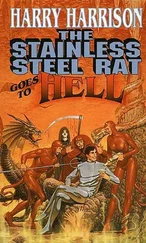“I’m going to hover at this altitude while we look for the target area,” Arnie said. Thankfully. He was too obviously aware of the thudding of his heart as it labored to pump blood in the doubled gravity. As he adjusted the controls weight fell away, to one gravity, and past that, until it felt as though they would float free. Hovering now, they were in the grip of the Moon’s gravitic field, a mere one-sixth of that of the Earth. “Rotating,” he said.
Loose objects rolled across the deck and clattered against the wall as they tilted over; they clung to the arms of their chairs. White light flooded in through the port.
uIh; du Almaegtige!” Nils whispered. There it was. Filling the sky. Less than seventy miles below them. Cratered, streaked, pitted, dead and airless, another world. The Moon.
“Then we’ve done it,” Ove said. “Done it!” he shouted with rising excitement. “By God we’ve crossed space in this tub and we’ve reached the Moon.” He unhooked his belt and stood, staggering as he tried to walk in the lessened gravity. Sliding, half falling, he slammed into the bulkhead, unheeding, as he braced himself to look out of the port.
“Just look at that, will you! Copernicus, the Sea of Storms, now where would the Sea of Tranquility be? To the east, in that direction.” He shaded his eyes against the reflected glare. “We can’t see it yet, but it has to be that way. Over the curve of the horizon.”
Silent as a falling leaf Blaeksprutten tilted back to the horizontal, then rotated about an invisible axis. They had to lean back to balance themselves as the bow swung down and the Moon reappeared, this time directly ahead.
“Is that enough of an angle for you to see to navigate by?” Arnie asked.
“Fine. There’s worse visibility from an airliner.”
“Then I shall hold this attitude and this height and switch forward and lateral control to your position.”
“On the way.” Nils hummed happily to himself as he pressed gently on his control wheel.
* * *
The three cosmonauts stood to attention as best they could in the cramped module with limited floor space: Zlotnikova had his nose pressed practically against the colonel’s hairy shoulder. The last notes of “The Internationale” died away and the radio speaker hissed gently with static.
“At ease,” Nartov ordered, and the other two dropped into their bunks while he picked up the microphone and switched it on. “In the name of my fellow cosmonauts, I thank you. They stand behind me, and agree with me, when in this moment of victory, I say that you, fellow citizens of the Union of Soviet Socialist Republics, should not grieve. This is a victory for us all; for the Party Chairman, Members of the Presidium, workers in the factories where parts of the rocket and capsule were manufactured, to be assembled by…”
Lieutenant Zlotnikova’s attention wandered: he had never been one for either making speeches or listening to them. Stolidly, he had listened to thousands upon thousands of hours of speeches during his twenty-eight years on Earth. And on the Moon. They were an accepted evil, like snow in the winter and drought in the summer. They were there, whether one liked it or not, and nothing could be done about them. Best to ignore them and suffer them, which was where a fatalistic, Slavic state of mind helped. He was a fighter pilot, one of the best, and a cosmonaut, one of the few. Attaining these goals was worth any sacrifice. Listening to speeches was only a minor bother. Even death was not too high a price to pay. He had no regrets; the game was worth the candle. But he just wished it could be done with a few less speeches. The colonel’s voice droned on and he glanced out of the viewport, then turned quickly away since at least an appearance of courtesy was called for. But the colonel had his back turned, with his right fist clenched in a salute and marking time to the strong rhythm of his words. It must be a good speech. At least the colonel was enjoying it. Zlotnikova turned back to the port—then tensed abruptly at the slowly moving speck of light high above. A meteor? Moving so slowly?
“…and how many died in battle to preserve the freedom of our great land? The Red Army never hesitated to embrace death for the greater good, peace, freedom, liberty, and victory. Should Soviet cosmonauts shirk responsibilities, or ignore the realities of—angrily he brushed away the bothersome hand that was tapping him on the shoulder. “…the realities of space flight, of the complexity…”
“Colonel!”
“—the complexity of the program, the great machines, the responsibilities…” Bothering him in the middle of this speech — was the bastard mad? “…to all the Soviet workers who made possible…”
Colonel Nartov wheeled about to glare and silence the lieutenant. But. his gaze followed Zlotnikova’s pointing finger to the port, through the thick glass, across the cratered, airless moonscape to the small submarine which was slowly settling down out of the star-flecked sky.
The colonel coughed, gasped, cleared his throat, and looked at the microphone in his hand with something resembling horror. “I will complete this call later,” he said abruptly, and switched off. “What the hell is that?” he roared.
For obvious reasons, neither of the other men answered. They were shocked, silent, and the only sound was the whispering of their last bit of depleted atmosphere coming through the grill, the mutter from the radio of distant music as someone back on Earth started the band playing again to cover the untimely silence from the Moon.
Slowly the submarine settled, no more than fifty meters from their capsule, hovering daintily the last few centimeters above the gravel before easing itself down. There were some strands of very dehydrated seaweed plastered to its keel, thin streaks of rust at the stern.
“Danish?” Shavkun gasped, pointing to the flag painted on the small conning tower. “That is Danish, isn’t it?” Zlotnikova nodded, silently, then realized that his jaw was gaping open and closed it wife a sharp click. The radio rustled and squealed, and a voice came in over the music in very loud, very bad, Russian.
“Hello Vostok IV, can you read me? This is Blaeks-prutten, and I have landed near you. Can you read me? Over.”
Colonel Nartov looked at the microphone in his hand and started to turn it on. He stopped and shook his head, trying to rally his thoughts, then reached for the radio controls. Only after he had cut the output power to a trickle did he switch on the transmitter. For some automatic defensive reason, he did not wish Moscow to hear this conversation.
“This is Vostok IV. Colonel Nartov. Who is that speaking? Who are you? What are you doing here—” The colonel cut himself off abruptly, feeling that he was about to start babbling.
Aboard Blaeksprutten, Ove listened and nodded. “Contact established,” he told the others. “Better put that curtain up now while I get them over here.” He switched the radio on. “Govoreetye ve po AngleeskeeT* he asked.
“Yes, I speak English.”
“Very good, Colonel,” Ove said, changing with some relief to that language. “I am pleased to tell you that we are here to bring you back to Earth. In your broadcast a few minutes ago you said that all three of you are all right. Is that true?”
“Of course, but… ”
“That’s fine. If you would get into your spacesuits…”
“Yes, but you must tell me…”
“First things first, if you please, Colonel. Do you think you could put on your suit and step over here for a minute? I would come myself, but unhappily we don’t have any space gear. If you don’t mind?”
Читать дальше
